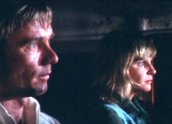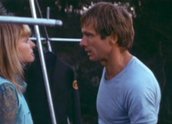


Long Weekend (1978)
Synopsis
Peter (John Hargreaves) and his wife Marcia (Briony Behets) drive out of the city for a long weekend’s camping by the sea. They are barely speaking to each other and Marcia hates the outdoors. They get lost in the dense coastal bushland that night and have to sleep in the car. Peter builds a camp early the next day and leads Marcia to the view. Their spirits lift with the magnificent unspoilt beach, but Marcia has a growing sense of unease, fuelled by a recurring sound, like a baby animal crying. When she sees a dark shape in the water, she cries out to Peter to get out of the water. Peter’s loaded spear gun goes off, nearly hitting her. Later, he takes the dog for a walk, wanting to try out his new gun. Along the beach, he sees a van on the dunes.
Back with Marcia, they kiss but she refuses to make love. They argue, so Peter goes for a surf. Again, she panics and calls him back. This time, he sees something. He shoots at it from the beach. She begs him to leave this place, but he refuses. An eagle swoops down and attacks Peter in the camp. Marcia smashes the eagle’s egg she found. They argue about the abortion she has had, after an affair that he encouraged.
That night, Peter is bitten by a possum. He agrees to leave next morning. They are packing up when Marcia sees a dead dugong on the beach – shot by Peter the day before. Peter insists on driving up the beach to check out the other campers. They find the van driven into the water, with the body of a young girl inside. Marcia becomes increasingly frantic to leave. They fight again and she takes off in the car. As night closes in, Peter loses his cool, firing wildly at noises in the bush. Marcia becomes lost and abandons the car. Peter arms himself with the spear gun after his ammunition runs out. He fires wildly at a noise in the dark. As the sun rises, he realises what he has done.
Curator’s notes
Long Weekend was shot on a low budget in 1977, but it didn’t get a release until March 1979. It made little impression at the box office – perhaps overshadowed in part by Mad Max (1979) opening a fortnight later – but it won numerous prizes in Europe and its reputation has continued to grow in recent decades. It’s an effectively creepy thriller that has attracted a cult following – probably because of the dugong that will not die. The whole film is a warning about ecological irresponsibility, but the dugong pushes it towards the satirical end of the genre.
Films about nature’s revenge were fairly common in Australian cinema in the 1970s, most of them terribly serious. Long Weekend was a bit more irreverent, although director Colin Eggleston was careful to play it fairly straight. Everyone could see that the attacks by birds, possums and an indestructible sea mammal were rhetorical, but what was not easy to dismiss was the strong sense of unease that these two people felt in the Australian landscape. Films like Walkabout (1971) and Wake in Fright (1971) had dramatised that unease before, but in a desert setting. Long Weekend was about the horror closer to home. These two people were camping by the beach, where Australians love to play, but this place was just as unforgiving as the desert. Vince Monton’s camerawork is very effective at enclosing them in hostile, impenetrable undergrowth; the extreme close-ups of ants and flora suggest a microcosmic threat. It’s a Gaian kind of idea – Mother Nature is angry at their deeply flawed and unthinking abuse of life in all forms, so she teaches them a lesson.
At the same time, Everett De Roche’s script suggests a more universal story. They are like Adam and Eve in the Garden of Eden – except that Eve has had an abortion. Marcia blames Peter for this – he encouraged her to have an affair with their neighbour, because he wanted to sleep with the neighbour’s wife. Peter blames her for having the abortion without even consulting him. What began as sordid suburban wife-swapping has now become tragic, and the threatening natural world is almost like a metaphor. It could be her nightmare, or her self-punishment. The dugong is female, pining for its lost calf, just as Marcia grieves for her lost pregnancy, or perhaps her self-respect. The abortion debate was very current in 1977, and few films wanted to go near it. Long Weekend isn’t exactly subtle in its exploration of it, with its exploding egg and broken-doll-on-the-beach symbolism, but it does avoid an outright sense of judgement against Marcia. Indeed, if anyone is judged here it is Peter, the uncaring, unthinking Aussie bloke who prefers beer and guns and the great outdoors, to taking care of his obviously distressed partner.
Susan Dermody and Liz Jacka, in their book The Screening of Australia Vol 2 (1988, Currency Press, Sydney, pp 124-26), describe the film as 'Old Testament’ horror. 'The implacable Old Testament logic of the film confines Marcia in her archaic role as the sullen original sinner; and the remote peninsula is a lonely Eden…’ They argue that the film 'accords with the self-loathing of liberal Australians for their material and spiritual sins against the continent’ – a theme that connects it directly with Peter Weir’s The Last Wave (1977).
Long Weekend was completely overlooked for nominations at the 1978 AFI Awards, but it remains one of John Hargreaves’s best performances of the 1970s. Briony Behets is also very effective as Marcia. She was married to Colin Eggleston at the time but she was not his first choice. Producer Richard Brennan says the director wanted Wendy Hughes; Behets was Brennan’s suggestion, as was John Hargreaves. The film was shot near Bega on the south coast of NSW, in 27 days, for a budget of $270,000. The film has recently been reissued on DVD in its correct ratio, Cinemascope, after many years when it was available only in a pan-and-scan TV version.
- Overview
- Curator’s notes
- Video 3 clips
- Principal credits
- Find a copy
- Make a comment
- Map
- Add your review



